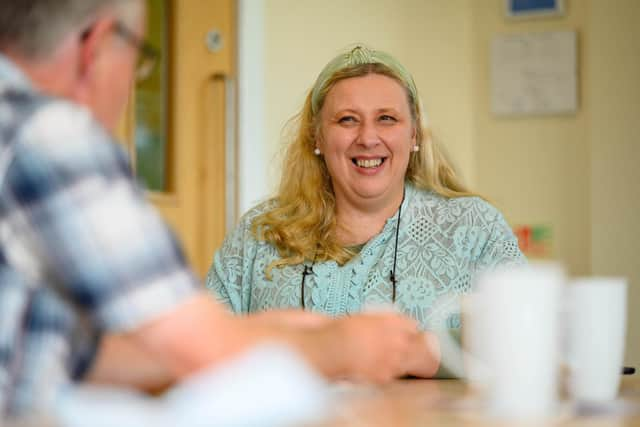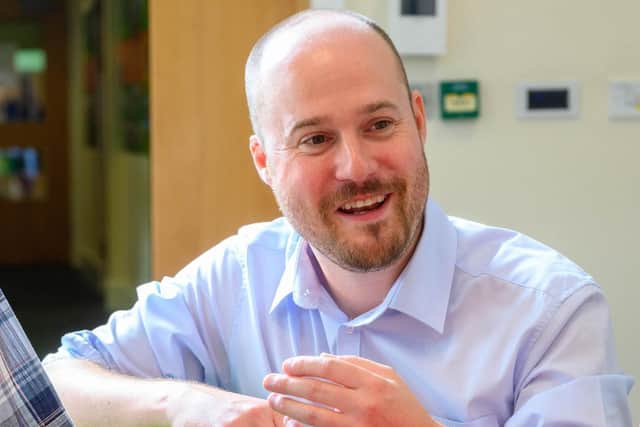Leeds woman describes how stroke left her unable to get her words out but now she can speak again thanks to support of Yorkshire aphasia charity
Deborah Fahey knew what she wanted to say, but she couldn’t get the words out.
She’d had a stroke.
She struggled to walk, was unable to move her right hand and damage to the left side of her brain had caused aphasia - difficulties with language and speech.


Advertisement
Hide AdAdvertisement
Hide Ad“I was talking rubbish, but I thought I was talking normally,” she recalls.
“My brain and my mouth were doing different things.”
It was “like being a baby”, she says, and having to learn how to talk all over again.
Deborah is one of around 360,000 people in the UK living with aphasia, yet it is believed that almost 85 per cent of people have never heard of the complex condition.


Deborah, 50, from Leeds, spent three weeks in Leeds General Infirmary after her stroke back in April 2016.
Advertisement
Hide AdAdvertisement
Hide AdFor six months after that, she stayed in Chapel Allerton Hospital, where she had speech and language support.
When she returned home, she was then referred to Wakefield-based aphasia support charity Speak With IT, which has helped her ever since.
In 2017, Deborah began to notice improvements, describing how “my brain and mouth went together - Hallelujah”.
After years of support from the charity, including through computer therapy programs, an aphasia cafe and conversational techniques, she’s now continually improving.
Advertisement
Hide AdAdvertisement
Hide AdDeborah says: “Although my brain was working and I knew what I wanted to say, I just couldn’t get the words out.
“I had to start again completely, with reading and talking.
“I was referred by the NHS to Speak With IT and they assessed me and matched me with a volunteer, who understood my frustrations and worked with me on my communication goals.
“With their support, and the apps and programmes that they helped me to navigate, I was able to work on my speech and improve my conversation skills.
Advertisement
Hide AdAdvertisement
Hide Ad“It took around three-years to get to the level I am at now, but through the support Speak With IT continue to provide, and my own motivation, I am continuously improving.”
Speak With IT focuses on improving people’s speech and language skills and their confidence, as well as boosting wellbeing and reducing feelings of isolation.
Currently funded by The National Lottery, it helps those living with aphasia to work on key communication goals with the support of speech and language therapists.
The charity matches patients with a trained volunteer who works with them on a one-to-one basis, using a variety of computer therapy programs, and supported conversation techniques.
Advertisement
Hide AdAdvertisement
Hide AdDespite the condition recently hitting the headlines when Bruce Willis announced he was stepping back from acting due to aphasia, there is little understanding of how it affects people, and the support available can vary greatly depending on location.
It is why, this June, Aphasia Awareness Month, Speak With It is highlighting the challenges that many people with aphasia face when it comes to getting help and support with their recovery and has set its sights on expansion.
CEO James Major says: “Aphasia is a very complex communication and language disorder that requires ongoing specialist support.
“The leading cause of aphasia is stroke, with a third of the 100,000 stroke survivors acquiring the condition.
Advertisement
Hide AdAdvertisement
Hide Ad“When NHS provision ends, some people can be left completely unsupported, with limited or no access to vital assistance.
“We want to end this postcode lottery by expanding our services across the whole of Yorkshire and beyond, to give every person living with aphasia the opportunity to access vital language and communication services.”
The charity works mainly across West, South and parts of North Yorkshire, offering one-to-one home visits and online sessions, as well as running run a number of aphasia cafes in Leeds, Wakefield and Barnsley which give people the opportunity to meet up and share experiences.
James is keen to expand Speak With IT’s work into East Yorkshire and the Midlands too - and there’s a name change in the pipeline to help make it clearer what the charity is about.
Advertisement
Hide AdAdvertisement
Hide Ad“June is aphasia awareness month so it’s a chance to be able to shine a spotlight on aphasia,” James says.
“It’s estimated there are about 85 per cent of people who don’t know what aphasia is and we think that needs to change.
“We’re working to raise awareness of aphasia but also to raise awareness of the charity.”
There’s also a charity bowling competition on July 3 at Broad Oak Bowling Club in Huddersfield.
Advertisement
Hide AdAdvertisement
Hide AdAs for Deborah her stroke recovery is a long journey, but as time goes on, her ability to talk, walk and be independent keeps improving.
“It is a long road to recovery, but it is possible with the right support,” she says.
For more information about the charity, visit www.speakwithit.org
People with aphasia may have trouble with reading, speaking, typing or writing and listening and understanding. The NHS explains: “It is often classified as “expressive” or “receptive”, depending on whether there are difficulties with understanding or expressing language, or both.
Advertisement
Hide AdAdvertisement
Hide Ad“Symptoms can range widely from getting a few words mixed up to having difficulty with all forms of communication. Some people are unaware that their speech makes no sense and get frustrated when others don’t understand them.”
Aphasia is caused by damage to parts of the brain which produce and understand language, due to stroke, severe head injury, brain tumour or progressive neurological conditions including dementia.
